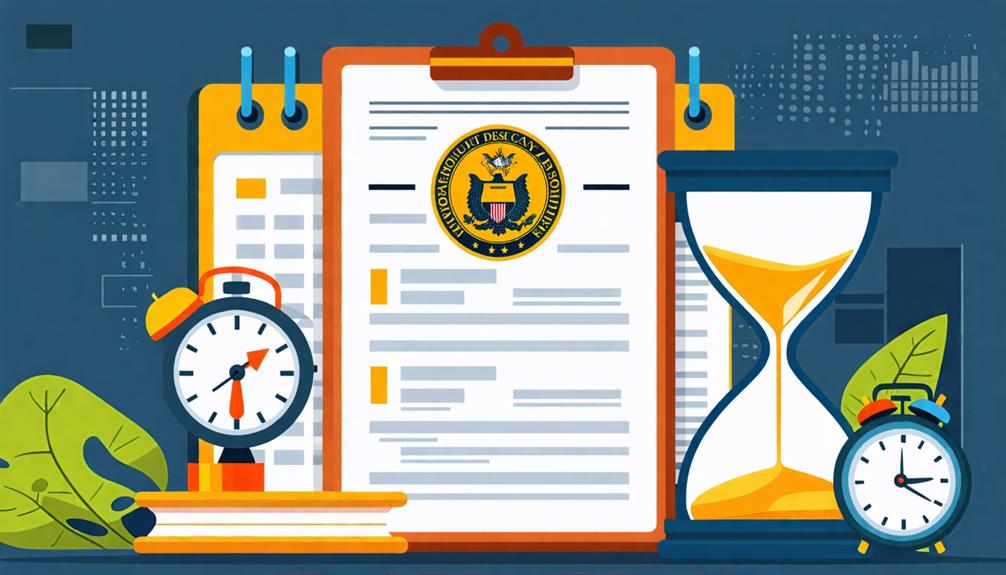BPSS clearance remains effective without a defined expiration date, provided the individual stays employed in the same job role continuously.
If an individual returns to the same job within a year, the clearance stays effective. However, a change in employers or job roles usually requires new checks to be conducted.
It’s advisable to carry out regular reviews every three to five years to ensure ongoing compliance and security.
The responsibility of initial vetting and recurring re-screening lies with the employers. They need to fulfill this duty to adhere to their legal obligations and to minimize potential risks.
A change in a job role or location may also necessitate updated clearances.
Additional information will provide more detailed aspects of maintaining BPSS clearance.
BPSS Clearance Duration
The BPSS clearance for British nationals does not have a specified expiration date, as long as the individual remains employed in a role that requires such clearance. If the individual leaves but returns to the same role within a year, the BPSS clearance still stands, eliminating the need to renew the clearance for short-term breaks or temporary departures.
While a new employer may accept an existing BPSS clearance, it is advisable that they conduct their own checks to ensure compliance and account for any changes in circumstances. This helps maintain the validity of the security screening process and ensures all legal obligations are satisfied.
Although the BPSS clearance does not have a fixed expiration date, it is advisable to conduct reviews every three to five years for continued security assurance. Legal obligations may also necessitate organizations to repeat the BPSS screening process at regular intervals to maintain compliance standards and reduce risks.
These actions ensure that the clearance remains up-to-date and reflects any changes in the individual’s circumstances or the security environment.
Continuous Employment Impact
Continuous employment in a position requiring BPSS clearance contributes significantly to maintaining the validity of the clearance without the need for renewal. There isn’t a defined expiration date for BPSS clearance for British nationals as long as they remain in continuous employment within a job necessitating such clearance. This continuity reduces the need for rechecking, making operational and administrative processes more efficient.
If an individual leaves their BPSS-required role but returns to the same position within a year, the clearance remains valid. This continuity eases the re-entry into the role without the redundancy of undergoing another screening process. However, while new employers may accept existing BPSS clearances, they are typically advised to conduct their own checks. This approach helps maintain compliance with legal obligations and organizational policies.
Organizations have the responsibility to vet their employees thoroughly, as lapses in clearance validity could pose significant risks. Even if an individual’s BPSS clearance is technically still valid, the organization might be legally required to repeat the screening process. Therefore, continuous employment is a key element in maintaining BPSS clearance validity, promoting both organizational security and efficiency.
Changing Roles or Locations
Alterations in roles or locations within an organization can influence the validity of BPSS clearance, particularly if the new position has different security requirements or grants access to sensitive information.
BPSS clearance for British nationals continuously employed in the same role does not have a concrete expiration date. However, a change in role or location could necessitate a new security check, especially when the new responsibilities involve higher security levels or access to more sensitive data.
For example, an update to BPSS clearance would likely be needed for a transition from a general administrative role to one that deals with classified information. The intent behind this is to ensure that all employees fulfill the security standards relevant to their roles.
It is a legal requirement for organizations to ensure proper vetting, which often means repeating the BPSS screening process when an employee moves into a new role or location.
Also, if a person returns to the same role within a year, their BPSS clearance is still valid, negating the need for reapplication. However, new employers might choose to redo these checks to confirm compliance with current standards, thereby upholding a strong security posture.
Employer Responsibilities
The responsibility of ensuring that BPSS clearance is obtained and maintained for all employees who require access to sensitive government assets or information rests heavily on employers. This duty not only involves the initial vetting process but also the ongoing monitoring and renewal of BPSS checks to uphold security protocols.
Adherence to the suggested review cycle of every three to five years is required from employers to ensure continued compliance with security standards.
A key aspect of this responsibility involves understanding that whilst BPSS clearance for British nationals does not have a set expiration date, it remains valid only under certain conditions. For example, employees returning to the same role within a year can maintain their BPSS validity.
Nonetheless, any break beyond this period requires a restart of the clearance process. This requirement emphasizes the necessity for employers to keep accurate records and swiftly address any changes in employment status.
Legal duties also require employers to carry out comprehensive vetting processes to minimize the risks tied to employing individuals without valid BPSS clearance. By diligently fulfilling these responsibilities, employers contribute significantly to preserving the integrity and security of sensitive government operations.
Periodic Review Recommendations
To uphold the security protocols, it’s recommended to perform routine examinations of BPSS clearance every three to five years. These evaluations are critical to ensure that individuals continue to fulfill the strict prerequisites necessary for their roles. Organizations can also implement ongoing background screening policies, which may require more frequent checks based on specific security needs.
Ignoring routine reviews may leave organizations vulnerable to significant compliance risks, including potential lawsuits and fines for not adhering to existing security standards. Regular evaluations play a key role in recognizing any changes in an individual’s situation, such as new criminal records or changes in employment history, which could affect their security status.
Adherence to BPSS standards through regular reviews is necessary for upholding the security processes and protecting sensitive data. Proactive management of BPSS clearance reviews allows organizations to decrease risks and ensure that their employees remain qualified for their assigned roles.
This vigilant approach not only encourages a secure work environment but also strengthens the organization’s dedication to maintaining high security standards, thus shielding both the organization and its stakeholders from potential security infractions.
Conclusion
BPSS clearance does not have a specific expiration date, but it does require careful management by employers to ensure its ongoing validity.
The clearance status is generally maintained by continuous employment, but changes in roles or relocations may call for a reassessment.
Employers have the responsibility to conduct regular reviews and updates to meet the security standards.
Following the recommended reviews periodically assures compliance and protects personnel security within organizations.
Therefore, keeping BPSS clearance current is vital for the integrity of the organization and the security of the nation.



